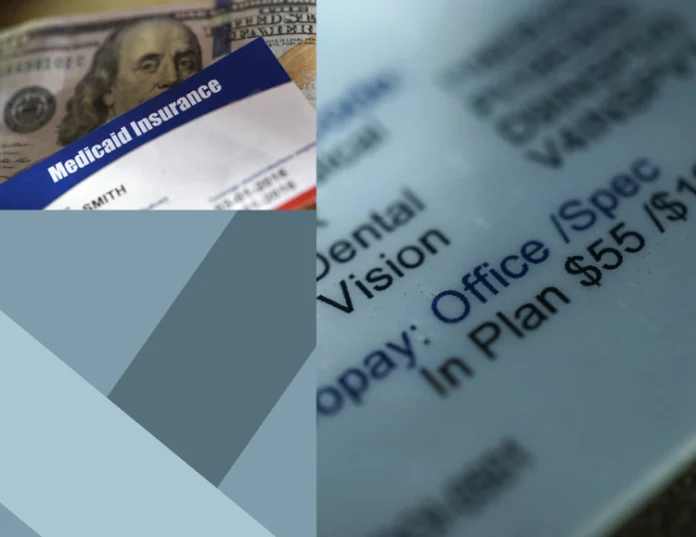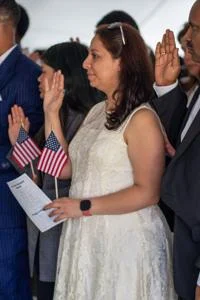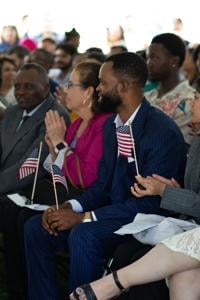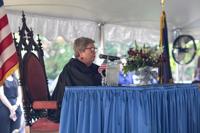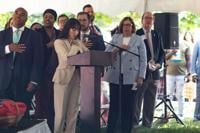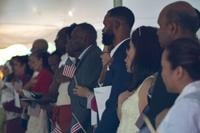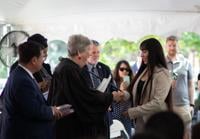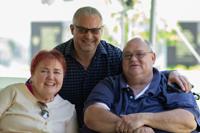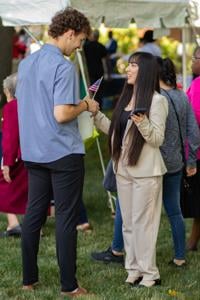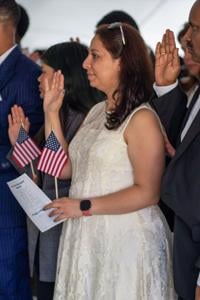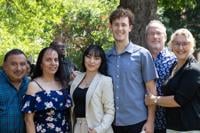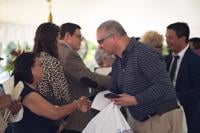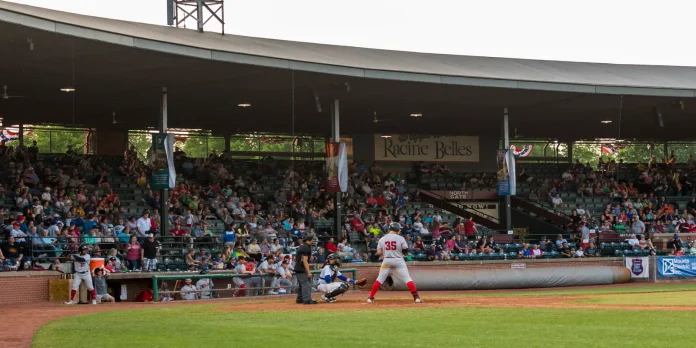By Marilyn Odendahl
The Indiana Citizen
JULY 5, 2023
Amid the questions about crime and road repair that seem to pepper every candidate running for mayor this primary season, Indianapolis voter David Craig Starkey was most intrigued by the question about taking big risks.
Starkey, general director of the Indianapolis Opera, attended the two town halls sponsored by The Indianapolis Star which featured the candidates running for mayor of Indianapolis. The Democratic challengers to incumbent Mayor Joe Hogsett were presented in a separate forum from the Republican candidates.
Questions had been solicited from Marion County residents, and the candidates were allowed to respond but could not interrupt or criticize any of their opponents. The mayoral hopefuls offered varied plans and proposals when they were asked questions related to making the Circle City a better place to live.
Indianapolis, the candidates were told, was built on taking big risks from digging a non-navigable waterway to investing to become the amateur sports capital and constructing a football stadium before an NFL team called the city home. They were then asked what big risk they would take as mayor.
From his vantage point, Starkey sees the “incredible arts and cultural community†as an “unsung hero†of Indianapolis that could possibly marshal art and music to help address the city’s problems with crime, homelessness, and mental health. It is a view that reflects his background. Similarly, he said, the candidates’ ideas for the next big risk provided insight into their thinking that the questions about crime, affordable housing, and infrastructure did not.
“We need to be able to understand our political candidates’ positions and their thoughts,†Starkey said after the Democratic candidate town hall. “Even the ones that are trying to vie for attention that may not even be serious candidates, but they are serious people within their community, and they may have some answers that are very helpful in this progress.â€
Hoosiers have the opportunity to make their own choices about local leadership as the polls opened at 6 a.m. Tuesday for the 2023 Indiana primary. This election is all about municipalities and at the top of the ballot are the candidates for mayor followed by hopefuls for other elected positions including clerk-treasurer, council and city court judge.
Of the 89 cities and towns with a mayoral primary, 40 have only Republican candidates on the ballot and four have just Democrats, according to the Indiana Secretary of State’s list of candidates. Voters in those 44 primaries may essentially be electing their mayors since the opposing party has not yet fielded a candidate to run in the November general election. Indiana law permits parties to fill vacancies on the ballot after the primary.
Aaron Dusso, chair of the political science department at IUPUI, said the issues driving voters’ decisions will be the problems or solutions that drew their strongest reaction within the last six months. For example, streets that did not get plowed last winter might push constituents to cast their ballots for the incumbent’s challenger.
Left out of voters’ calculus are the policies and initiatives that involve big-risk thinking. Much of this work might take place out of the public eye and would be difficult for voters to link to more prominent concerns.
Keeping a city vibrant, Dusso explained, requires good schools and good housing options which attract families to move to and stay in the community. Crime rates can be lowered by fostering economic development that bring jobs that pay a living wage. And, to ensure to the new companies the workforce will be available, the city may have to bolster the public transportation system so residents can easily get to those jobs.
“There’s no one silver bullet to any of this. To try and improve your community over a 10- to 20-year time horizon, you have to be doing all these kinds of things at once with the idea that eventually this stuff pays off,†Dusso said. “And it’s tough to do because it’s oftentimes they’re the boring things that people don’t ultimately vote on.â€
Power of the mayor’s office
In response to the question about taking big risks, Rev. James Jackson, a Republican, and Democratic state Rep. Robin Shackleford talked about creating venues where local and out-of-town families can gather for fun and relaxation.
Shackleford advocated transforming downtown Indianapolis into an “entertainment mecca.†Her vision is to connect the attractions in the center of the city with trails, easy ride shares and biking so everyone can come together.
“A lot of people now are in their homes because of COVID,†Shackleford said. “They’re happy working in their homes but what I hear from people is there is no place for us to come out and interact, especially when it comes to downtown.â€
Jackson pushed to revive plans to put a beach on the White River. He also proposed installing a high-speed train between Indianapolis and Chicago.
“Indiana is the second most important city in America in this region,†Jackson said. “Chicago is the most important city in the American Midwest region. That kind of relationship and big risks would be a risk that benefits lots of people.â€
Meanwhile, businessman Larry Vaughn, a Democratic candidate, and attorney Abdul Hakim-Shabazz, a Republican candidate, offered ideas anchored in economic development.
Hakim-Shabazz believes Indianapolis should capitalize on what he sees as the opportunity created by the policy ideas of the coming administration in Chicago. The mayor-elect of the Windy City, Brandon Johnson, has proposed $800 million in new taxes including a $4 tax per employee for large companies.
“I don’t know how that’s going to create jobs or do anything,†Hakim-Shabazz said of the worker head tax. “I’d rather have those jobs here, the capital of the Midwest. So that’d be my goal during my term is making Indianapolis the capital of the Midwest.â€
Vaughn called for the city to curb the tax incentives that are given to businesses located in Indianapolis.
“We need to stop giving private businesses money,†Vaughn said. “That’s the risk that we’ve taken now.â€
Self-employed businessman John Couch, a Republican, offered an idea that mixed entertainment with business investment. He wants more venues for concerts and plays. Also, he sees the land around the Indianapolis International Airport as ripe for development with hotels and restaurants which would create jobs.
Vanessa Cruz Nichols, assistant professor of political science at Indiana University Bloomington, said typically mayors spend the first two years of their term enacting the agendas and proposals they campaigned upon. The third and fourth years are spent building their legacies.
A legacy is built by a mayor listening to constituents and nonprofits to get feedback on the administration’s work and garner ideas for new programs and policies. In addition, the mayor has to get the electorate excited and enthusiastic about new initiatives.
“It’s by being visionary by being proactive as opposed to constantly putting out a fire, constantly being reactive,†Cruz Nichols said, noting the ideas and solutions will come from the residents themselves but the mayor’s imagination will also increase the electorate’s enthusiasm. “So I think that’s an important thing to kind of provide that vision, to provide that sort of more proactive initiative as opposed to constantly being reactive and pulled by multiple crises in various directions.â€
As the incumbent mayor finishing his second term, Hogsett was able to point to his record when talking about taking big risks. He said under his leadership, the city had taken a risk by building the Community Justice Campus on the east side of Indianapolis which includes the courts, county jail and a treatment center for individuals struggling with addiction and mental health issues.
“When I became mayor back in 2016, one of the first things I did was impanel a criminal justice reform task force,†Hogsett said. “As a result of their findings, we now have a state-of-the-art community justice campus. We have as its gemstone the assessment and intervention center which its sole purpose is to divert people who are low-level offenders, keep them out of jail and give them the treatment that they so desperately need.â€
Jefferson Shreve, founder of Storage Express and a Republican candidate, was the most cautious, saying the mayor has to manage the city’s resources and not take big risks. The mayor needs to lead those “that are most engaged†on big bets that create a vision or project which everyone can coalesce around rather than making high-risk plays that could waste taxpayers’ money.
“If I come out of this primary, I need to lead that effort with other key stakeholders in our city to figure out what our big bets are going to be on that will be the next multi-decade play,†Shreve said. “There are some good ideas out there. But those need to be ideas that we come together – civic, business and the philanthropic community – because when we can bring those three together, and God bless the Lilly Endowment, this city can get some good things done.â€
However, Cordelia Lewis Burks, former vice chair of the Indiana Democratic Party, said the city of Indianapolis is limited by the Indiana Statehouse.
Laws enacted by the Republican-controlled legislature have interrupted initiatives in different Hoosier cities to ban plastic grocery bags and to mandate companies to pay an hourly rate above minimum wage. She linked the current wave of violent crime to the General Assembly’s passage of a law that rolled back the requirement for permits to carry a firearm.
Even so, Lewis Burks also put some of the responsibility for the good government on the voters. She called on the residents to know and communicate with their elected officials.
“Anybody that doesn’t know who represents them is not a good citizen in my opinion,†Lewis Burks said.
Dusso acknowledged mayors’ efforts can be hampered by state and federal governmentsAZFDDSAc. But mayors can still be effective by building relationships with neighborhoods and community leaders to rally constituents and get support for the administration’s programs.
Having the support of the residents will give a mayor more power and influence when working with other elected officials and other parts of the government.
“The best and most successful mayors … are going to be the ones that have built strong kind of grassroots connections to people around the city,†Dusso said. “Mayors that struggle are the ones that come in without those kinds of connections kind of imposed and then they struggle to get anything done because they don’t even know who to talk to.â€
Electoral involvement
Indiana has consistently ranked among the bottom states in terms of voter registration and voter turnout for midterm and presidential elections. Cruz Nichols noted municipal elections see even lower turnout even though ballots cast in those races have a bigger impact than those cast in national races.
“There’s really no excuse not to vote in a local municipal mayoral election where your vote is a very direct form of democracy,†Cruz Nichols said. “Your vote matters a whole lot more.â€
Also echoing Lewis Burks, she said constituents need to stay engaged after the election. They should communicate with their elected officials, voicing their concerns as well as volunteering within their communities.
“So residents have to be willing to share their input, willing to share in the vision for a solution,†Cruz Nichols said. “Not just providing only critiques but also coming up with new solutions, look to your neighbors, look at what your friends are doing, and talk to one another.â€
Tim and Mary DuVall attended the town hall for Republican mayor candidates even though they live in Hamilton County. All residents of the counties surrounding Marion County have an interest in the direction and politics of Indianapolis, they said. Moreover, by attending candidate forums and talking to elected leaders, even nonresidents could have an impact.
“You can still make your voice heard through questions and conversations,†Mary DuVall said. “I think just making sure that you’re engaged in the city even though you live in the doughnut county. For those that might be working in the city, they might be living in one of the doughnut counties, it certainly impacts them and finding ways to support or help out even though they may not be able to do their work life, understanding that you can have a voice even though it may not be through a vote.â€


